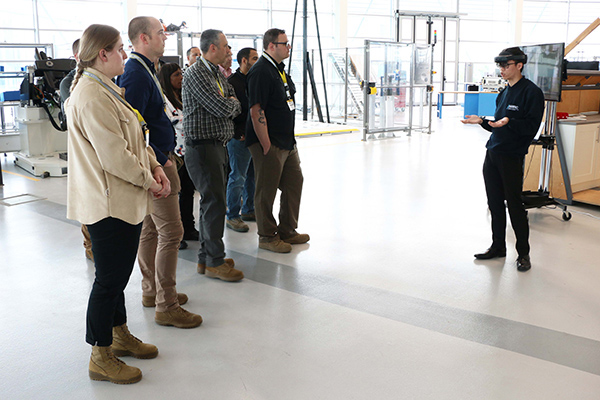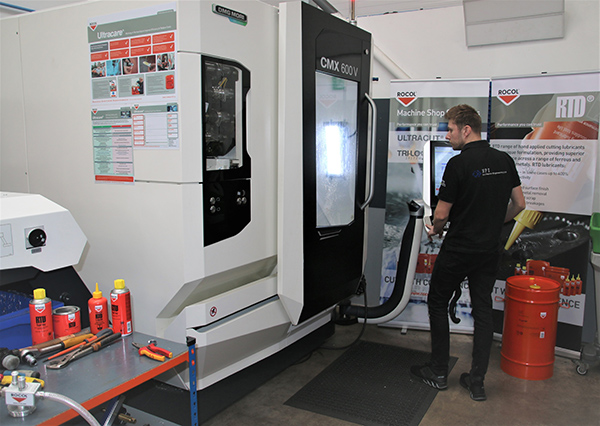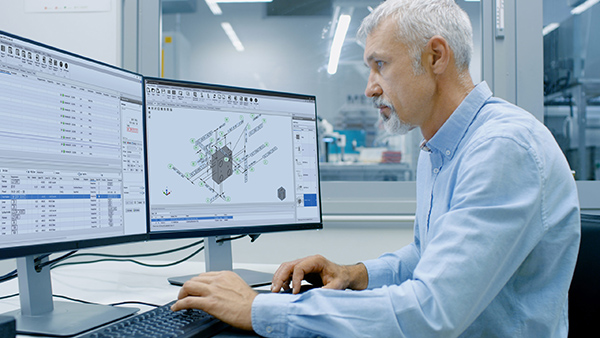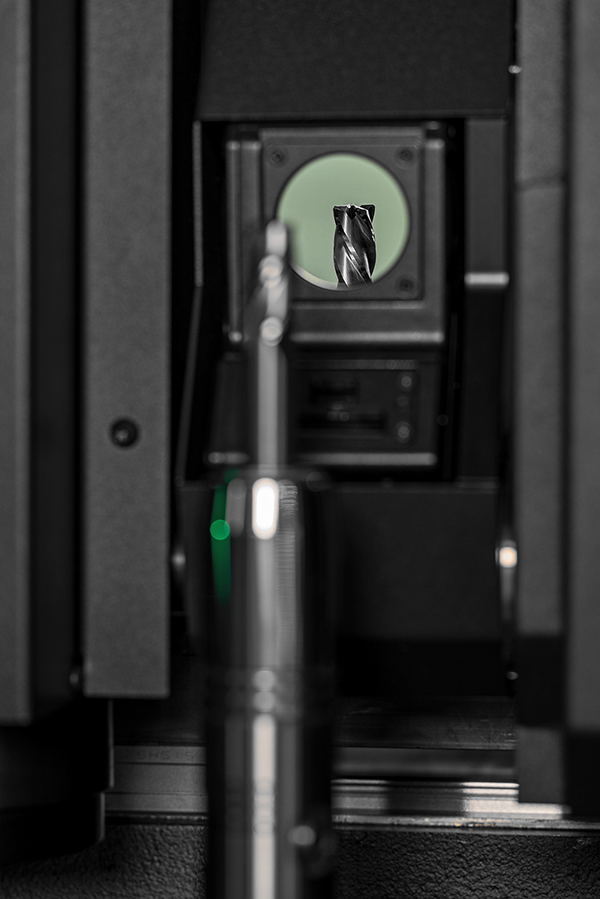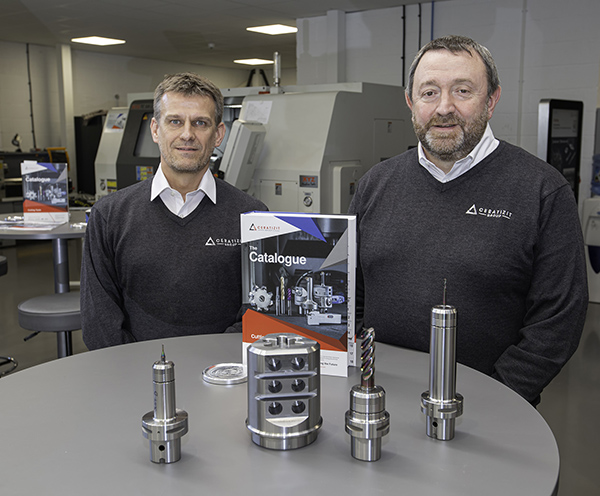
Bristol-based Nerc Precision Engineering (NPE) Ltd has been on a rapid growth trajectory since its inception in May 2018, marking the fourth anniversary of its founding with the recent installation of a DMG Mori CMX600V machining centre. Investing in prestige technology is a philosophy of this small business, as highlighted by its newly formed partnership with cutting fluid specialist ITW Rocol.
Commenting upon the growth of the business, managing director Konrad Nerc says: “When my wife and I started the business, we aimed to invest in the best technology to ensure that we could deliver the highest quality components and service with lead times and pricing that would be the industry benchmark. As a small and agile manufacturer with innovative technology investments that include five-axis machining, our philosophy and customer service is enabling us to evolve rapidly.”
In the past two years, the subcontract manufacturer has invested in a DMG Mori DMU50 five-axis and a CMX600V three-axis machining centre that are supported by zero-point clamping from Lang, cutting tools from Ceratizit, Hoffmann and Tungaloy and, of course, cutting fluid from ITW Rocol. Producing everything from one-offs and prototypes to batch production, the ISO9001-accredited subcontract manufacturer typically serves customers in the defence, offshore, automotive and general subcontract sectors, with the aerospace industry rapidly emerging as its most prominent market.
Like any fledgling business, finding the best quality products and services is a learning curve, and this has certainly been the case for the company located near Bristol airport when considering its cutting fluids.
“Our initial cutting fluid supplier was a well-known name in the industry, but the quality of the fluid was quite poor,” says Nerc. “The fluid consumption was high, the coolant left a lot of residue on our components, we suffered from tramp oil and foaming, and the staff suffered with skin irritation. We soon moved to a very high-end brand of cutting oil. This premium brand eliminated tramp oil, foaming and skin irritation for staff, while the consumption was also reduced and it improved tool life and surface finishes. However, we found the poor service unacceptable, especially considering the increased cost for a barrel of oil. We eventually moved to a third vendor with a brand equally well recognised as a premium product. Although the quality of fluid, performance and cost were relatively similar to the second supplier – once again, it was the service and support that was lacking.”

This trial and error process led Nerc to cast a hopeful query on LinkedIn for advice and support. It was here that ITW Rocol answered the call for help.
“ITW Rocol came to investigate our cutting fluid requirements,” says Nerc. “Following an initial consultation, we trialled three different Rocol fluids. Testing more than one product was due to the diversity of the materials we were cutting, the varying operations and machining parameters, and some of the products being new to market for Rocol. Rocol emptied and cleaned the sump of a machine, and we tried our first fluid, and the results were impressive. The quality of the fluid was excellent, and the support has been second to none.”
Since the trial commenced last year, Nerc has won a series of new customers and sizeable orders in the aerospace industry, with work in this sector now accounting for 95% of turnover. This has seen the materials machined narrow from stainless steel, steel, copper, brass and a multitude of ferrous and non-ferrous metals, to primarily aluminium and aerospace-grade alloys. With this evolution, ITW Rocol identified its TRI-Logic cutting fluid as the most suitable solution. TRI-Logic is a range of maximum-life, extreme-pressure cutting fluids which demonstrate inherent stability and cutting performance that improves surface finish and tool life while reducing foaming and odours. Furthermore, as a fluid formulated from a proprietary blend of specially selected additives that maximise sump life, TRI-Logic also offers high corrosion protection.
To undertake the trial, ITW Rocol supplied a 55-litre barrel of its TRI-Logic to Nerc. This barrel was utilised in the initial trial that required the emptying and cleaning of one machine sump to demonstrate the difference between Rocol and its fellow ‘premium-brand’ rivals. With the results rapidly becoming evident, the remainder of the barrel was used to continually ‘top-up’ the fluid of the remaining three machines to limit disruption to production while maximising results for Nerc.
From a results perspective, fluid life has improved drastically and oil consumption has reduced by over 50%. Logic would tell any engineer that a 50% consumption reduction would naturally reduce the fluid costs by 50%, yielding a huge saving. However, the ITW Rocol TRI-Logic EP has a retail cost 50% less than its rival premium brands. With a 50% reduction in the purchase price and a 50% fluid consumption reduction, the savings are even higher.

“The 50% cost reduction is something that every small business wants to take advantage of, but when the consumption also reduces by 50%, the cost of coolant stops being a concern,” says Nerc. “Our initial 55-litre barrel lasted from July to February and we’ve recently taken delivery of a 200-litre drum of TRI-Logic. Our initial projections were that Rocol’s TRI-Logic would provide a cutting fluid consumption reduction of 25%. However, with the new aerospace work, we’re running four machining centres up to 16 hours a day and we are busier than ever before. Running at optimal production rates, we’re recognising that our cutting fluid consumption is at least 50% less.”
The performance of the two previous premium brands far exceeded that of the first brand used by Nerc in terms of extended tool life, sump life, improved surface finishes, and reductions in foaming, tramp oil, oil residue on parts, and skin irritation. The ITW Rocol TRI-Logic has matched and even exceeded the performance of its rival brands in all areas.
The 200-litre barrel of ITW Rocol’s TRI-Logic cutting fluid has been supplied with an automatic fluid mixer that accurately mixes and dispenses the correct dilution of cutting fluid and water. With a built-in double-check valve and vacuum breaker that is WRAS approved, the system meets the most stringent of safety requirements for category 3 fluids and ISO EN 1717 regulations.
“For our business, specifying cutting fluid has been the hardest thing to get right and find an improvement,” states Nerc. “Unlike capital and ancillary equipment, the challenges with cutting fluid can be the most difficult aspect of the business to optimise. The challenge of trialling new coolants has several implications. For example, emptying and cleaning machines to trial fluids can be time-consuming with machine downtime – and then there is the concern that the new fluid may not improve your productivity, fluid life and tool life; or it may not be compatible with the materials machined. There’s also concern over tramp oil, foaming, residue on components, skin irritation, disposal and much more. Thankfully, Rocol resolved all of this, and the results have been fantastic.”
With service and support from all three of its previous cutting fluid vendors being an issue for the company, Nerc concludes: “The service and support from Rocol is second to none. They reviewed our business, listened to our concerns and then provided a solution that has exceeded everything else that went before. Most importantly, a Rocol engineer is always on call to check our machines and support us accordingly.”
For further information
www.rocol.com







